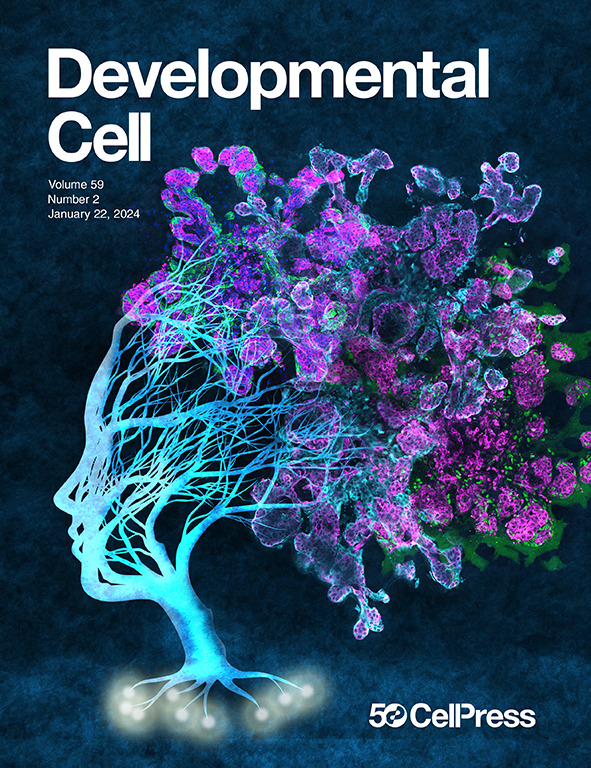Sumoylated Etv1建立小鼠乳腺癌干细胞,支持非干细胞癌细胞的肿瘤发生
IF 8.7
1区 生物学
Q1 CELL BIOLOGY
引用次数: 0
摘要
小泛素样修饰因子(SUMO)途径是维持癌症干细胞/肿瘤启动细胞(CSCs/TICs)所必需的,当移植到免疫功能低下的小鼠中时,CSCs/TICs会驱动肿瘤发生。我们发现,抑制SUMO通路可阻断new介导的乳腺肿瘤发生,抑制CSCs/TICs的功能,而对正常乳腺干细胞没有影响。转录组学分析表明sumo偶联的Etv1对肿瘤的发生至关重要。在SUMO通路抑制后,通过与SUMO1或SUMO2融合产生的SUMO-拟合Etv1蛋白建立了能够发生肿瘤的干细胞样细胞,而SUMO-抗性Etv1蛋白则建立了增殖性、非致瘤性细胞。在混合实验中,干细胞样细胞通过非干细胞诱导肿瘤发生。我们得出结论,sumo偶联的Etv1对于维持CSC/TIC表型是必要的,并且干细胞和非干细胞之间的串扰对肿瘤发生至关重要。这些发现证明了异质细胞类型之间的动态相互作用驱动肿瘤发生,这对未来癌症治疗的发展具有重要意义。本文章由计算机程序翻译,如有差异,请以英文原文为准。

Sumoylated Etv1 establishes mouse mammary cancer stem cells that support tumorigenesis by non-stem cancer cells
The small ubiquitin-like modifier (SUMO) pathway is required for maintenance of cancer stem cells/tumor-initiating cells (CSCs/TICs), which drive tumorigenesis when transplanted into immunocompromised mice. We found that inhibition of the SUMO pathway blocked Neu-mediated mammary oncogenesis and inhibited the function of CSCs/TICs without effects on normal mammary stem cells. Transcriptomic analysis implicated SUMO-conjugated Etv1 as being critical for oncogenesis. After SUMO pathway inhibition, a SUMO-mimetic Etv1 protein, created by a fusion with SUMO1 or SUMO2, established a stem-like cell capable of tumorigenesis, whereas a SUMO-resistant Etv1 protein established a proliferative, non-tumorigenic cell. In mixing experiments, stem-like cells induced tumorigenesis by non-stem cells. We conclude that SUMO-conjugated Etv1 is necessary to maintain the CSC/TIC phenotype and that crosstalk between stem and non-stem cells is crucial for tumorigenesis. The findings demonstrate dynamic interactions between heterogeneous cell types to drive tumorigenesis, which has implications for future cancer therapeutic development.
求助全文
通过发布文献求助,成功后即可免费获取论文全文。
去求助
来源期刊

Developmental cell
生物-发育生物学
CiteScore
18.90
自引率
1.70%
发文量
203
审稿时长
3-6 weeks
期刊介绍:
Developmental Cell, established in 2001, is a comprehensive journal that explores a wide range of topics in cell and developmental biology. Our publication encompasses work across various disciplines within biology, with a particular emphasis on investigating the intersections between cell biology, developmental biology, and other related fields. Our primary objective is to present research conducted through a cell biological perspective, addressing the essential mechanisms governing cell function, cellular interactions, and responses to the environment. Moreover, we focus on understanding the collective behavior of cells, culminating in the formation of tissues, organs, and whole organisms, while also investigating the consequences of any malfunctions in these intricate processes.
 求助内容:
求助内容: 应助结果提醒方式:
应助结果提醒方式:


